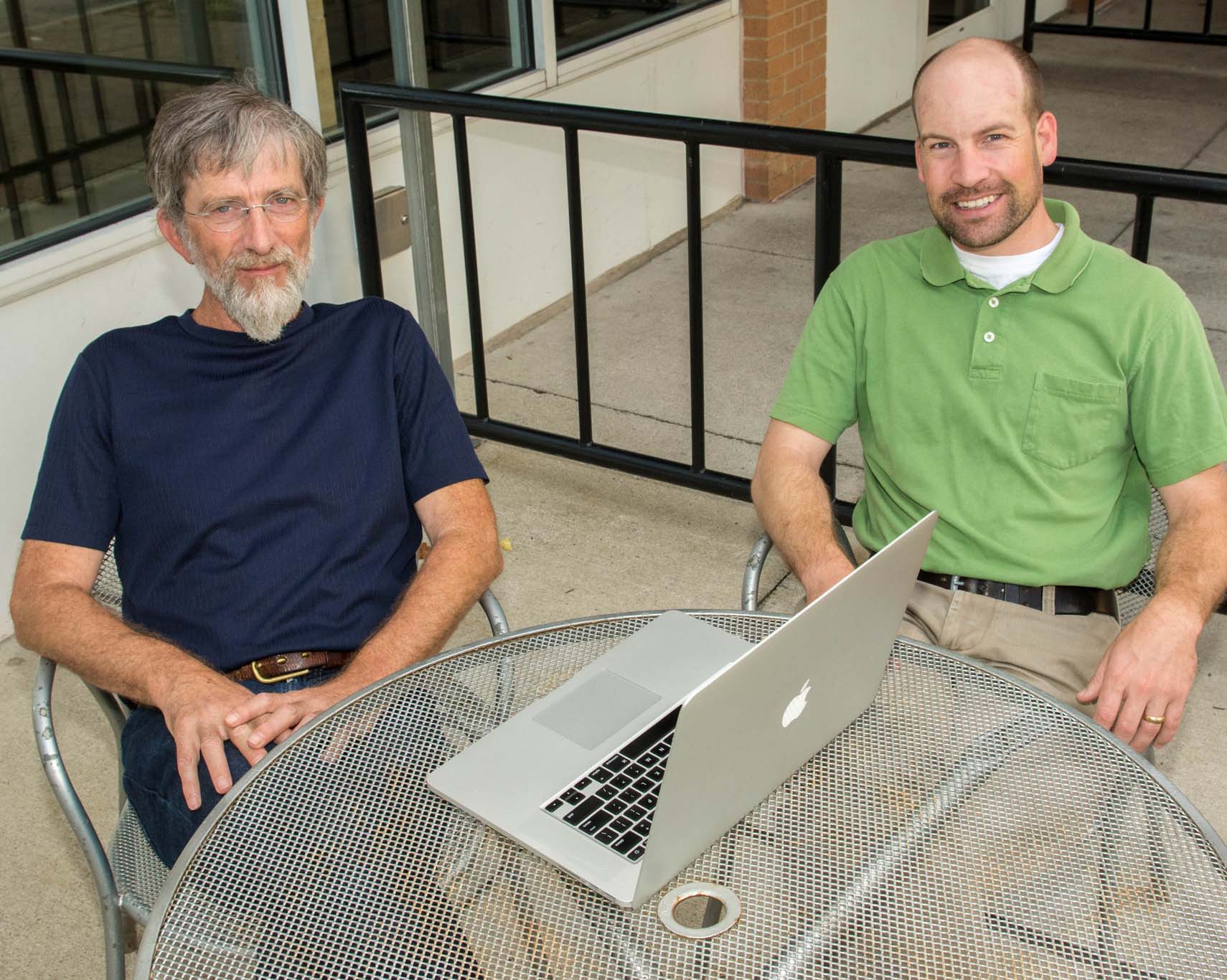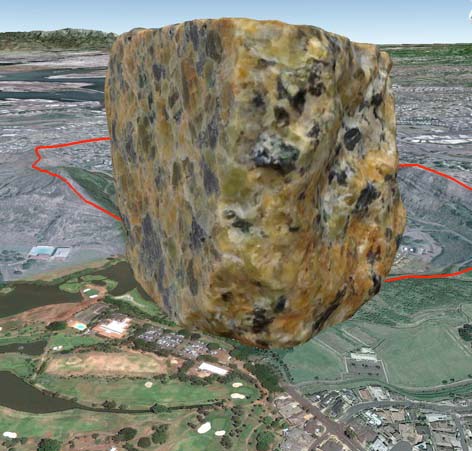$2 Million from NSF to Support Google Earth Geoscience Project
September 06, 2013
 Declan De Paor (left) and Stephen Burgin
Declan De Paor (left) and Stephen Burgin
 An image of a rock from Earth's mantle that was brought to the surface in a Hawaiian volcano (red line in background). ODU student Melissa Bateman made a 3D scan that De Paor geo-loacted to its original collection location on Google Earth. ©2012 Google Inc. Image ©2013 GeoEye.
An image of a rock from Earth's mantle that was brought to the surface in a Hawaiian volcano (red line in background). ODU student Melissa Bateman made a 3D scan that De Paor geo-loacted to its original collection location on Google Earth. ©2012 Google Inc. Image ©2013 GeoEye.
Declan De Paor, an Old Dominion University professor of geophysics with research interests in structural geology, has taken hundreds of students on geological field trips in his day and he has dust on his boots to prove it. But his new plan to develop virtual expeditions using Google Earth promises to benefit thousands of students, only without the dust.
The National Science Foundation is backing De Paor's plan with $2 million in funding, and he has joined with some 20 international colleagues, including ODU education faculty member Stephen Burgin, to develop what the team calls GEODE ("Google Earth for Onsite and Distance Education").
ODU will receive $1 million over the four-year term of the grant. Co-principal investigators other than Burgin include Steve Whitmeyer and Kristen St. John at James Madison University and Callan Bentley of Northern Virginia Community College.
De Paor said he has been working toward this project since soon after the release of Google Earth in 2005, and he and Whitmeyer have received previous, smaller grants from NSF and Google to develop their ideas about Google Earth applications in the geoscience classroom.
By 2009, De Paor was making headlines internationally for creating 3-D data visualizations and models of the Earth's geology and geophysics as enhancements to Google Earth. In 2010, he and Whitmeyer were authors of a well-received article in GSA Today, the magazine of the Geological Society of America, titled "The Digital Revolution in Geologic Mapping." The article explained how mobile computers and software with integrated GPS (global positioning system) are used to record and interpret geologic data in the field, and how digital field data and map interpretations are then presented in virtual 3-D terrains using Google Earth. In 2012, De Paor and Whitmeyer joined with John Bailey of the University of Alaska - Fairbanks and Tina Ornduff of Google Geo Group to edit a Geological Society of America special paper on the topic comprising 35 manuscripts.
"We've been presenting workshops and digital poster sessions on this topic at conferences and it's really popular," De Paor said. "Google Earth is an incredible tool."
The new project, he added, is an effort to create virtual field trips and authentic research experiences for undergraduate students. Among the key concepts is a "grand tour" via Google Earth of field locations. "These are sites, say, in Iceland or South Africa or Colorado, that every geoscience student should know about and visit, at least in virtual reality if not in person," he said.
For anyone who has noticed the publicity garnered recently by the massive open online course (MOOC) phenomenon, De Paor calls GEODE "the inverse" of MOOCs. "Instead of one professor lecturing to numerous students, as in a MOOC, we will assemble numerous professors around the world who will create virtual field trips in their areas of expertise. The format will open opportunities for nontraditional geoscience students, including those with jobs or mobility restrictions that prevent them from physically climbing mountains or diving in coral reefs."
Specific project goals are to:
-- Create an online course consisting of the virtual "grand tour" of places every geoscience student should know about and appreciate. Each student will select a subset of these tours to "follow" in order to complete his or her course assignments. Tours will include small student group interactions with GigaPans, virtual specimens, virtual outcrops and game-style apps, including "egg hunts" where students are told to search for features in a panorama and the computer auto-scores their actions based on what locations they zoom to and focus on.
-- Use Google Maps Engine and Google Earth Engine to link big geoscience data sets to Google Earth and build these into learning modules. This will enable both onsite and distance students to have authentic undergraduate research experiences via data mining, collaborative analysis and discovery of research results, potentially leading to publications. Burgin is an expert in authentic undergraduate research, meaning projects where the student has a genuine research experience including the possibility of making scientific discoveries and publishing results.
-- Hold faculty professional development workshops. These will be offered at both national and regional meetings and online.
The project is funded under the NSF Division of Undergraduate Education's TUES program ("Transforming Undergraduate Education in Science, Technology, Engineering and Mathematics"). This Type 3 award builds on successful Type 1 and Type 2 projects that De Paor led in 2008 and 2010. According to the NSF, it is one of about 30 new Type 2 and 3 awards that will be made this year out of 373 proposals submitted.
The GEODE grant further bolsters ODU as a leader in STEM (science, technology, engineering and mathematics) education, and is another example of increased recent collaboration between researchers in the College of Sciences and the Darden College of Education. One such collaboration between the two colleges is MonarchTeach, which the university launched this fall. It is a first of its kind program in Virginia that is designed to increase the number of high-quality mathematics and science instructors in middle and high schools. Burgin, who is with ODU's Department of STEM Education and Professional Studies, is associated with MonarchTeach, and it was his outreach to expand his collaboration with scientists at ODU that led to a meeting with De Paor and to their joint grant application.
Burgin and De Paor praised the budgetary support they received from Nicole Swartz, a grant and contract administrator with the ODU Research Foundation.
The geospatial research activities of De Paor and Whitmeyer are also supported this year by two new Google Geo Curriculum awards.
In addition to his work with virtual tours of the Earth, De Paor has a background in geophysics that allows him to lead virtual tours of other planets; he is the director of the university's Mary D. Pretlow Planetarium.

